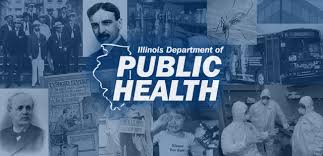The Illinois Department of Public Health (IDPH) is reporting the first confirmed measles case of 2025 in Illinois. The case, involving an adult in far southern Illinois, was confirmed through laboratory testing on April 23. This is the only case IDPH is aware of and this is not considered an outbreak at this time. IDPH will update the public should there be any notable developments. The risk of community transmission for the general public in Illinois remains low.
IDPH is working with local health officials to identify all potential exposure locations. The clinic in southern Illinois where the patient sought care is working to identify any possible exposed patients and check immune status of those individuals. All exposed healthcare staff were wearing masks and are considered immune.
Anyone exposed and not immune to measles should stay alert for any signs and symptoms of measles such as rash, high fever, cough, runny nose, and red, watery eyes, and notify their local health department if they become symptomatic.
Illinois has had no other reported cases of measles since an outbreak in Chicago in early 2024 that resulted in 67 cases. However, IDPH has been closely monitoring the outbreak in Texas and New Mexico that has resulted in more than 680 confirmed cases, including three deaths, two of them children. Nationally, the CDC is reporting 800 cases of measles have been confirmed in more than 25 jurisdictions around the United States, more than double the national total in 2024.
“This first reported case of measles in Illinois in 2025 is a reminder to our Illinois residents that this disease can be prevented with up-to-date vaccination,” said IDPH Director Dr. Sameer Vohra. “With hundreds of cases being reported nationally, we have been working closely with our local public health and health care partners to prepare for any potential measles cases in Illinois. IDPH is urging medical providers to consider a measles diagnosis in patients with consistent symptoms and alert their local health department immediately if they suspect a case.”
Most people are vaccinated routinely in childhood and are not at high risk of measles. Of most concern are people who have not been vaccinated including infants – initial measles vaccine is recommended at 12-15 months – or people who can’t get vaccinated because of other health concerns. Individuals who think they have been exposed should check with their health care provider about protection through prior vaccination or the need for vaccination.
After exposure to someone with measles, symptoms can take from seven to 21 days to show up. Individuals who develop symptoms of measles should contact a health care provider by phone or email BEFORE going to a medical office or emergency department. It is important to share specifically that you have a concern that you may have measles. Special arrangements can be made for your evaluation while also protecting other patients and medical staff from possible infection.
IDPH advises that for people traveling internationally or to a U.S. state with a measles outbreak, it is especially important to check vaccination records. Unvaccinated or under-vaccinated individuals should ideally receive their vaccine at least two weeks prior to travel to an area with a high risk of measles.
“The key to preventing measles is the highly effective measles/mumps/rubella (MMR) vaccine. Two doses of measles vaccine are 97% effective in preventing measles,” said Dr. Vohra. “I recommend that our Illinois residents make sure that they and their family members are up to date on the MMR vaccine and all other age-appropriate immunizations.”
As part of IDPH’s preparations for potential cases of measles, the department recently unveiled a new data dashboard to help school officials and members of the public assess the potential severity of any school outbreaks of measles, should one occur in Illinois. The new Measles Outbreak Simulator Dashboard makes it easy for the public to find out the measles vaccination rate in any school in Illinois, public or private, and to determine the risk of a child being exposed to measles if a case is introduced in their school.
IDPH stresses the importance of ensuring everyone in your family is up to date on their immunizations. Since the COVID-19 pandemic, vaccination rates in the United States have dropped, increasing the likelihood of more cases of vaccine-preventable diseases. Individuals can protect themselves and their communities by doing their part and ensuring their families are up to date on vaccines.
For more information about measles, contact your health care provider, or visit the Illinois Department of Public Health webpage on measles or the CDC’s measles site.
***Courtesy of the Illinois Department of Public Health***















